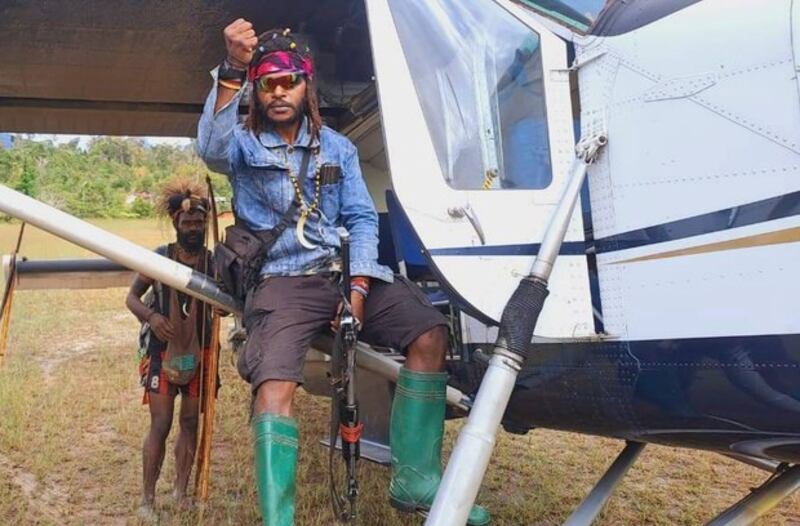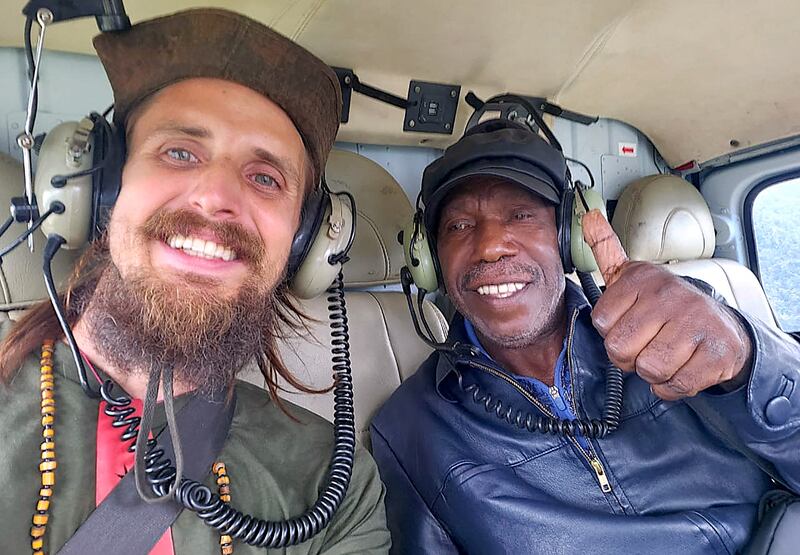Jakarta and Wellington on Monday denied claims by a Papuan rebel spokesman that Indonesian authorities had paid a guerrilla commander to free a New Zealand pilot from 19 months of captivity.
Egianus Kogoya, who heads a faction of Papuan independence fighters in Nduga regency, inappropriately accepted an Indonesian “bribe” offered via a local politician to release Phillip Mehrtens, the pilot who was freed on Saturday, the spokesman for the armed wing of the Free Papua Movement alleged.
“Egianus Kogoya and his group accepted bribe money from the Indonesian military and police, betraying the national chain of command,” Sebby Sambom, spokesman for the West Papua National Liberation Army (TPNPB), told BenarNews.
“They are nothing more than a criminal gang that took the pilot hostage purely for money.”
Rumadi Ahmad, from Indonesia’s Presidential Staff Office, rejected Sambom’s allegations.
“As far as we are concerned, this is untrue,” he told BenarNews.
Maj. Gen. Hariyanto, spokesman for the Indonesian armed forces, said the military and police had prioritized peaceful negotiations with the rebels.
“This is the fruit of a 19-month long effort,” Hariyanto told BenarNews.
New Zealand Foreign Minister Winston Peters called the allegations “disgraceful” and said there was no evidence of a ransom being paid.
“We don’t pay ransom, we don’t pay bribes,” he told Radio New Zealand.
Mehrtens, 38, was working as a pilot for Indonesian airline Susi Air when rebels seized his plane shortly after he landed at an airstrip in the Papua highlands on Feb. 7, 2023. After he was taken hostage, the Papuan rebels demanded independence for the region in exchange for his release.
TPNPB’s decades-old insurgency aims to free Papua from Indonesian rule.
Papua was officially integrated into Indonesia in 1969 following the controversial “Act of Free Choice,” a U.N.-sponsored referendum which, according to locals, saw just around 1,000 Papuans voting under heavy military presence in its favor.
However, the United Nations accepted the result endorsing Jakarta’s rule.

Sambom said Kogoya had no right to hand over the pilot to local politician Edison Gwijangge, whom he accused of exploiting the situation for personal gain in the upcoming Nduga regent election.
According to Sambom, the politician took custody of Mehrtens from Kogoya’s group and handed him to the Indonesian military and police to give the impression security forces had orchestrated the release.
Video footage from the day of his release showed Mehrtens shaking hands with locals and boarding a helicopter. Armed rebels were visible but no Indonesian military or police were present.
Sambom alleged that Kogoya had acted against the TPNPB’s plan.
Sambom was referring to a Sept. 17 video in which he announced the rebels would free Mehrtens “on humanitarian grounds,” although their demand for Papuan independence remained unchanged.
“The command had already sent a proposal [outlining the terms of the release], which means Egianus must adhere to it due to the military hierarchy,” he said.

A spokesperson for the New Zealand Ministry of Foreign Affairs and Trade focused on the positive outcome of Mehrtens’ release in a statement to BenarNews, sidestepping the allegations of bribery.
“We now have the result we had been working towards, which is Phillip’s release and return to his family,” the statement said.
Meanwhile, Mehrtens’ family expressed their profound relief following his release after enduring a “long and arduous ordeal.”
“The last 19 and a half months have been very difficult for all of us, and we give our heartfelt thanks to our friends, family, and community for their love and kindness during this time,” New Zealand media quoted his family as saying in a statement on Sunday.
“We also thank General Kogoya and his forces for keeping Phil safe and healthy,” the statement said.
Kogoya achieved notoriety in Indonesia in December 2018 when he and the group he led killed 23 people, mostly construction workers in Papua. He was about 19 years old back then.
RELATED STORIES
[ New Zealand pilot freed after 19 months in Papua rebel captivityOpens in new window ]
[ New generation of Papuan rebels ups ante in conflict with IndonesiaOpens in new window ]
Theo Hesegem, a prominent Papuan human rights activist, lauded both the TPNPB and Indonesian authorities for enabling Mehrtens’ release.
“The pilot’s release from Egianus was achieved thanks to productive communication that was intensively built with Egianus’ group and the Indonesian military and police,” Hesegem told BenarNews.
However, he called for clarification on any agreements between the two sides, expressing concern about the lack of transparency surrounding the handover.
According to Hesegem, Kogoya may have lost some of his power in demanding concessions related to Papuan autonomy.
“I see that previously Egianus Kogoya had strong political bargaining power regarding self-determination or Papuan independence,” Hesegem said.
“This political bargaining seems to have weakened and shifted towards economic and business bargaining, making Egianus appear inconsistent.”
The separatist conflict in Papua, which has simmered since the 1960s, has resulted in thousands of deaths and widespread displacement.
While Indonesia has attempted to integrate Papua through infrastructure development and increased autonomy, many Papuans continue to push for self-determination, citing decades of discrimination, military violence, and exploitation of their natural resources.
Last week, a new report by New York-based Human Rights Watch highlighted what it described as entrenched racism and systemic discrimination against the indigenous Melanesian people of Papua.
The report said that the Indonesian government has responded to calls for independence with arbitrary arrests, torture, forced displacement, and extrajudicial killings.
International human rights organizations have consistently urged Indonesia to permit independent investigations into the human rights situation in Papua, but the government has imposed restrictions on access to the region.
Sue Ahearn contributed to this report from Melbourne.
